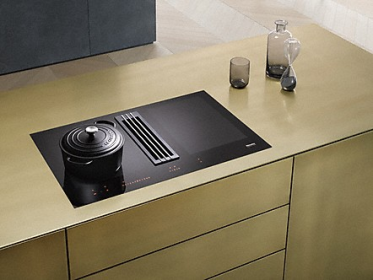
The Water Factory in Melbourne by Andrew Simpson Architects incorporates sustainable appliances into the renovation of a former industrial building. Photograph by Shannon McGrath.
On first look the whites of our appliances may blur to similar shades but they vary greatly in terms of energy-efficiency and operating costs. While it’s an obvious statement – the more energy-efficient an appliance is, the less it costs to run. So, in simple terms you can lower your energy bill and help protect the environment by buying right in the first place.
Sure, it may require a larger investment upfront, but as appliances can account for up to 30% of your home energy use, it’s worth investigating. As an example, Miele’s ovens use residual heat utilisation – a buzzword in ovens and cooking and for good reason. Some of the key manufactures have realised that better energy efficiency can be achieved if you control cooking times. As a result, ovens can switch off early and finish the cooking process with residual heat without affecting the overall cooking result. Ovens aren’t quite cooking the evening meal themselves but it’s getting closer.
So, what else should we look out for when applying appliances to our homes?

Using residual heat to finish the cooking can save on energy bills. Image courtesy Miele.
Energy-efficient appliances
As our reliance on appliances increases and energy prices are also on the rise, choosing energy-efficient appliances becomes more essential. We are also fortunate to be able to buy appliances that have a design aesthetic that can marry with the most stylish home. From an environmental perspective the national standards for energy efficiency are improving the performance of appliances all the time, so upgrading to a more efficient appliance can save you energy and money.
It's not just about having the right product – how you use appliances in your home can make a big difference. For example, washing your clothes with cold water can save up to 5 times more energy than a warm wash. If you look at the running costs like a "second price tag" it could help you decide which appliance to buy.
Many electric appliances sold in Australia have an Energy Rating Label to help you compare how much electricity the product uses against other appliances. The label also provides an incentive for manufacturers to improve the energy performance of household appliances. There's also an Energy Rating Label video which provides more useful information. A Gas Rating Label (voluntary scheme) can be found on gas space heaters, ducted heating, and gas water heaters.
One appliance that is on 24/7 – and was the worst culprit in terms of sustainable practices is the household fridge … remember CFC’s? We’ve come a long way now with modern technologies such as optimisation of the refrigeration circuit and insulation, which is meaning up to 40% less energy than comparable models

Ovens are a permanent fixture in your kitchen so choosing one that will last, and caring for it will save you some serious headaches. Image courtesy Miele.
Did you know?
When the kids come off the pitch, drying their uniforms in an electric clothes dryer generates more than 3kg of greenhouse gas. Energy Rating Labels are mandatory on all televisions, computer monitors, air conditioners (single phase, non-ducted), clothes dryers, dishwashers, washing machines, fridges and freezers. There is also a voluntary energy rating labelling program for swimming pool pumps.
There are two label styles: the normal 6-star label and the 10-star label for appliances rated as 7 stars and higher.
What about the coffee?
When it comes to the morning ritual of a caffeinated brew, the coffee machine is one of the most used appliances in our homes. It’s big business for the cafés and growers though if you choose to spend your $3.50 a day on an in-built barista it adds up to something worth caring for.
Choosing a coffee machine that automatically handles descaling, limescale and cleaning of the frothing channel is essential to ensure your ‘have here’ doesn’t become a ‘throw away’. As with other appliances, these advancements in technology can save you power, time and ultimately mean you product will see the test of time.
At the end of the day, when you reach for that craft beer or preservative-free rosé, the right choice of appliance means your ethical curtains match your environmentally friendly stripes.
WRITTEN BY HouseLab









